If you’ve drank dandelion tea then you might be wondering what the side effects are. I’ve written about making your own dandelion tea in a previous article which I’ll reference here too.
But let’s focus here on the side effects of drinking dandelion tea, starting with a quick roundup.
Dandelion tea side effects:
- May cause allergic reactions in some people
- Can act as a natural diuretic and may cause dehydration if not drunk in moderation
- Some say it can lead to excessive gas and bloating
- May interact with certain medications
Suffice it to say, not all these side effects will affect every person, some may experience no dandelion tea side effects at all, and others may only experience mild changes or discomfort.

Also, keep in mind this article is not aimed at providing medical advice. If you have any medical concerns, then you should consult your doctor before making any changes to your diet.

Take the fast track and become a tea connoisseur
Whether for enjoyment or considering a career as a tea sommelier. This course has everything you need to enhance your tea knowledge and tea-tasting skills.
This course keeps it simple with step-by-step tea tasting and easy reference guides
For pleasure, or as a precursor to a career in the tea industry. Find out what tea sommelier actually does, their career paths, and what they earn.

Find out more about the Teahow Tea Sommelier Course!
Dandelion tea side effects
Now let’s take a closer look at each of these. Then afterward, I’m going to take you through a few dandelion tea benefits – in order to provide some balance to this question.
Allergic reactions
Dandelion tea comes from the dandelion plant, so if you’re allergic to this plant, it’s likely you’ll be allergic to the tea as well. Symptoms of an allergic reaction can include itchiness, swelling, shortness of breath, and hives.
If you experience any of these after drinking dandelion tea, discontinue use immediately and consult your doctor.
Tip: Often we develop allergic reactions when we consume a new food or drink. So, if you’ve never tried dandelion tea before and are interested in doing so, it’s best to start with just a small sip. Wait a few minutes to see how your body reacts before consuming more. Build up the amount you drink slowly over a period of time, and do not consume too much – drink in moderation.
Dehydration
Dandelion tea is a diuretic, which means it helps promote urination. This can be beneficial if you’re trying to flush toxins out of your body or reduce water retention. However, it can also lead to dehydration if you’re not careful.
Drinking dandelion tea in moderation should be fine, but make sure to stay hydrated by drinking plenty of other fluids throughout the day. Avoid drinking dandelion tea if you’re already dehydrated or at risk for dehydration, such as during hot weather or after exercising.

Upset Stomach
Dandelion tea may cause an upset stomach in some people. This is most likely due to the fact that dandelions are a bitter herb. Bitterness is often associated with digestive discomfort.
If you have a sensitive stomach, you may want to avoid dandelion tea or brew it with a sweetener such as honey. Here’s which honey you should use for tea.
You can make your own dandelion tea as I’ve done here. This method uses purely natural ingredients.
Or you can also try different brands of dandelion tea like these, to see if some are less likely to cause an upset stomach than others.
Heartburn
Dandelion tea can also cause heartburn in some people. This is likely due to the fact that dandelions are a bitter herb. Bitterness is often associated with digestive discomfort.
If you have heartburn, you may want to avoid dandelion tea or brew it with a sweetener such as honey. See my post here for the best type of honey for tea.
Kidney Stones
Dandelion tea has a high concentration of potassium. While this is generally a good thing as maintaining correct potassium levels in the body is important, too much potassium can lead to kidney stones in some people.
If you already have a history of kidney stones, you should talk to your doctor before drinking dandelion tea. They may recommend that you limit your intake or avoid it altogether.
Gas and Bloating
One of the dandelion tea side effects is that it potentially causes gas, and bloating in some people.
This is likely due to the fact that dandelion is a natural diuretic, meaning it helps promote urination. When your body expels water and electrolytes through urine, it can also expel air, leading to gas and bloating.
If you are prone to gas or bloating, you may want to avoid drinking dandelion tea. If you do drink it, make sure to monitor changes in your body’s response to the drink.
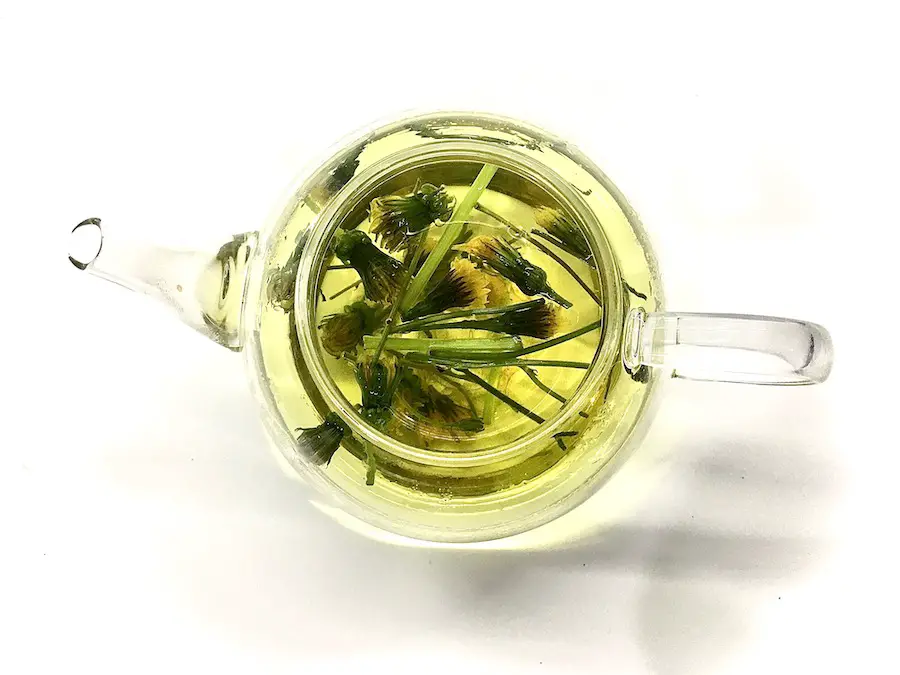
Diarrhea
Another dandelion tea side effect is diarrhea. This is also likely due to the fact that dandelion is a natural diuretic. When your body expels water and electrolytes through urine, it can also expel feces, leading to diarrhea.
If you are prone to diarrhea, you may want to avoid drinking dandelion tea. If you do drink it, make sure to monitor changes in your body’s response to the drink.
Interactions with Medications
Dandelion tea can also interact with certain medications, such as diuretics and lithium. Diuretics help the body get rid of excess water and salt. They’re often used to treat conditions like high blood pressure and heart failure.
Lithium is a medication used to treat bipolar disorder. It works by stabilizing mood swings.
If you take diuretics or lithium, talk to your doctor before drinking dandelion tea. There’s a possibility that the tea could increase the effects of these medications.
Roasted dandelion tea side effects
Dandelion tea, whether roasted dandelion tea, boiled dandelion tea, or another method, is generally safe to drink. However, with roasted dandelion tea, some people may experience slightly different side effects, such as upset stomach, heartburn, diarrhea, nausea, vomiting, headache, or dizziness.
If you experience any of these side effects, stop drinking roasted dandelion tea.
But what about roasted dandelion root tea and its side effects?
Roasted dandelion root tea side effects
There are various parts of dandelion you can make tea from. One of those is by roasting the root to make dandelion root tea.
Roasted dandelion root tea has the same potential side effects as regular dandelion tea. However, since the root is roasted, it may be more likely to cause gastrointestinal issues, such as heartburn, indigestion, or upset stomach.
If you experience any of these side effects after drinking roasted dandelion root tea, stop drinking it and see a doctor if the symptoms persist.
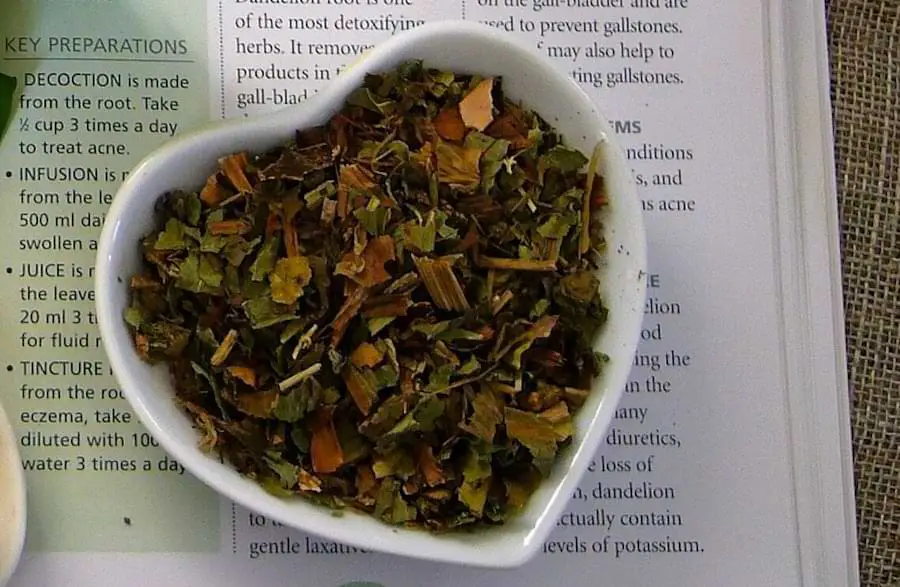
Benefits of dandelion tea
This all sounds like doom and gloom, but dandelion tea does provide a number of benefits, so I will quickly outline them below. Then we’ll answer a few general questions.
Great source of antioxidants
Dandelion tea is a great source of antioxidants. These are nutrients that scavenge harmful toxins, or free radicals, from the body. Free radicals have been linked to a number of diseases, including cancer.
Provides vitamin A
The vitamin A in dandelions can help keep your eyes healthy. It may also help reduce the risk of some types of cancer.
Aids in digestion
Assuming you’re not suffering from any dandelion tea side effects, then dandelion tea may actually help to improve your digestive health by stimulating the production of bile.
Bile helps break down fats in the digestive tract. It also has a mild laxative effect, which can help relieve constipation.
Aids in weight loss
Drinking dandelion tea may also aid in weight loss. This is likely due to the diuretic effect of the tea, which can help flush out excess water and toxins from the body. Additionally, dandelion tea may help boost metabolism and promote feelings of fullness.

Lowers cholesterol levels
Dandelion tea may also help lower cholesterol levels. This is likely due to the presence of taraxasterol, a compound found in dandelion that has been shown to reduce cholesterol.
Reduces inflammation
Dandelion tea may also help reduce inflammation throughout the body. This is thanks to the high levels of antioxidants present in dandelion tea, which can help neutralize harmful free radicals.
And here’s my bonus benefit…
Natural feel-good drink
There is also the feel-good factor. Making, and drinking your own tea, potentially from natural ingredients (not to mention FREE!) does provide you with an enormous natural sense of well-being.
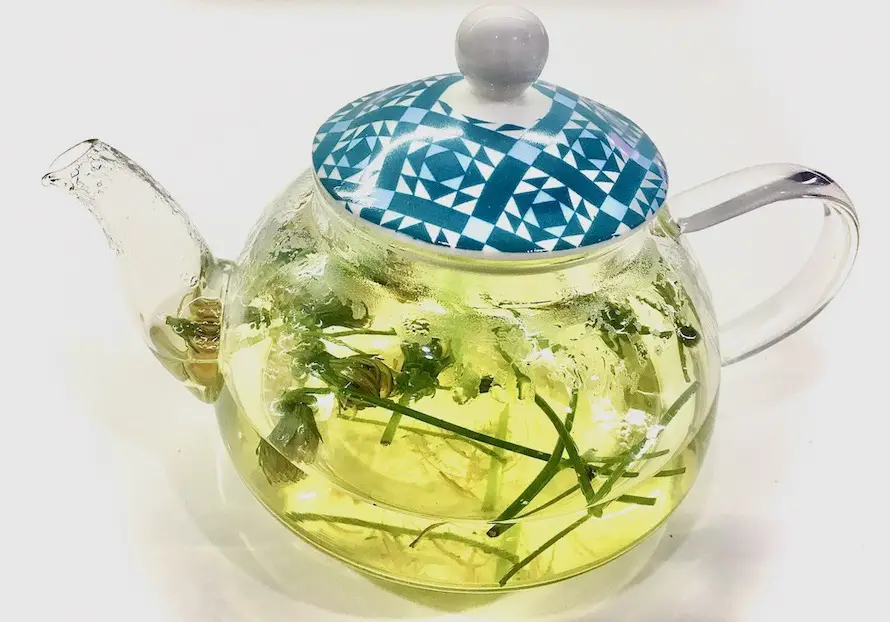
Dandelion tea side effects – Related questions
Let’s tackle a few questions that may arise from drinking dandelion tea. I’ve alluded to some of these throughout my post.
Can I drink dandelion tea every day?
Yes, you can drink dandelion tea every day. Just be mindful of the potential side effects, such as increased urination and dehydration. It’s important to stay hydrated when drinking any type of diuretic tea. As a general rule, try to stick to just one cup per day for plenty of benefits.
Is dandelion tea good for weight loss?
Dandelion tea may help with weight loss due to its diuretic properties. However, there is no scientific evidence to support this claim. There are alternative teas that specifically target weight loss, such as Blue tea, Catherine tea, or even Green tea.
Or see my post on green tea alternatives for weight loss, detox, and more.
Can dandelion tea help with bloating?
Yes, dandelion tea can help with bloating. This is because dandelions are a natural diuretic, which can help to flush out excess water and salt from the body. Assuming that you are not feeling side effects of bloating itself which may happen in some people, then dandelion tea can help.
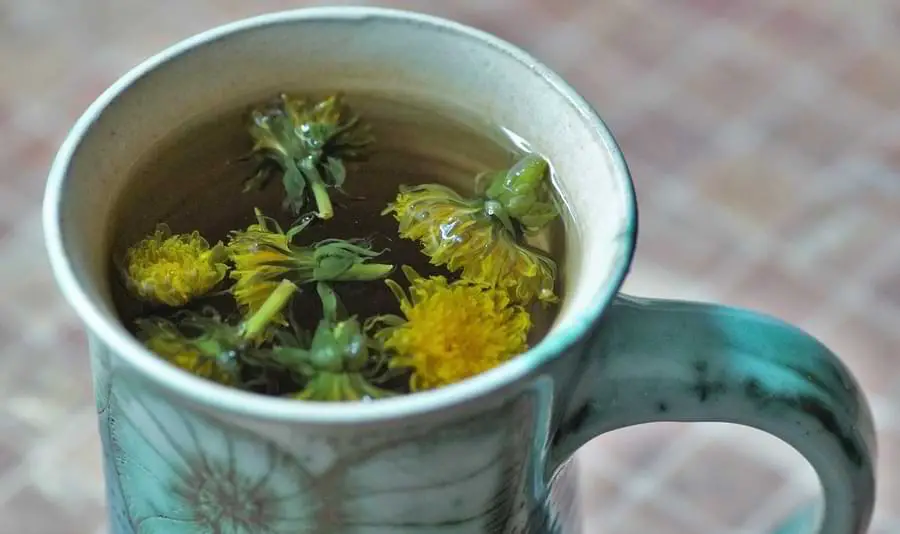
Who should not drink dandelion tea?
People who are allergic to dandelions should obviously not drink dandelion tea. People with kidney stones or other kidney problems should also avoid drinking dandelion tea, as it can make these conditions worse. If you are pregnant or breastfeeding, you should also avoid drinking dandelion tea.
This is because there is not enough scientific evidence to show that it is safe for pregnant or breastfeeding women to consume.
Finally, if you are taking any medications, you should speak to your doctor before drinking dandelion tea, as it can interact with some medications.
Generally speaking, dandelion tea is safe for the vast majority of people to drink. However, as with anything, there are some potential side effects that you should be aware of before you start drinking it. These side effects are outlined above, and if in any doubt then consult your doctor for advice.
Can dandelion be harmful?
Dandelions are not harmful. Allergic reactions to dandelions are possible but rare. Some people may experience an upset stomach after eating dandelion greens. If this occurs, stop eating dandelion greens and see if your symptoms improve. With dandelion tea, you are not directly eating the plant, so there are fewer potential issues.
It’s also worth noting, that if you have ragweed allergies, you may also be allergic to dandelions.
Does dandelion cleanse the body?
Dandelion is a natural diuretic. This means that it helps to promote urination and can therefore help to cleanse the body. Drinking dandelion tea may help to flush out toxins and excess water from the body. This is often why people choose to drink dandelion tea. It may also help to relieve bloating and water retention.
Does dandelion tea cleanse the liver?
Dandelion tea is often drunk for its liver-cleansing properties. The liver is responsible for filtering toxins out of the body, so it is important to keep it healthy. Dandelion tea may help to cleanse the liver and promote its health.
If it’s detoxing that you’re particularly interested in, then you might want to try – Lemon tea vs Green tea. Or, Green tea alternatives.
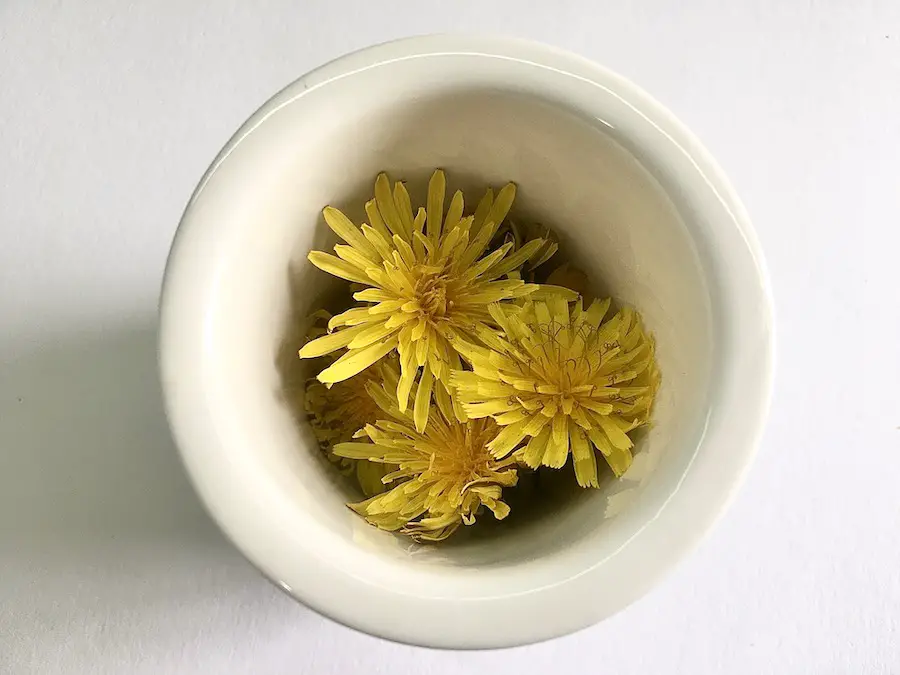
Dandelion tea side effects – More tea help
I hope this has helped – in a balanced way – to provide some background on the side effects of dandelion tea based on the research I’ve undertaken.
Of course, I’m a tea blogger, not a medical professional, so be sure to consult with your doctor on any of these points if you feel there may be potential health issues. And check out my awesome tea sommelier course.
